Comparison of Business Culture in UK and China
VerifiedAdded on 2023/04/21
|14
|3629
|321
AI Summary
This report compares the business culture of UK and China, including their cultural backgrounds, analysis using Hofstede's model, challenges to business, and implications on management.
Contribute Materials
Your contribution can guide someone’s learning journey. Share your
documents today.
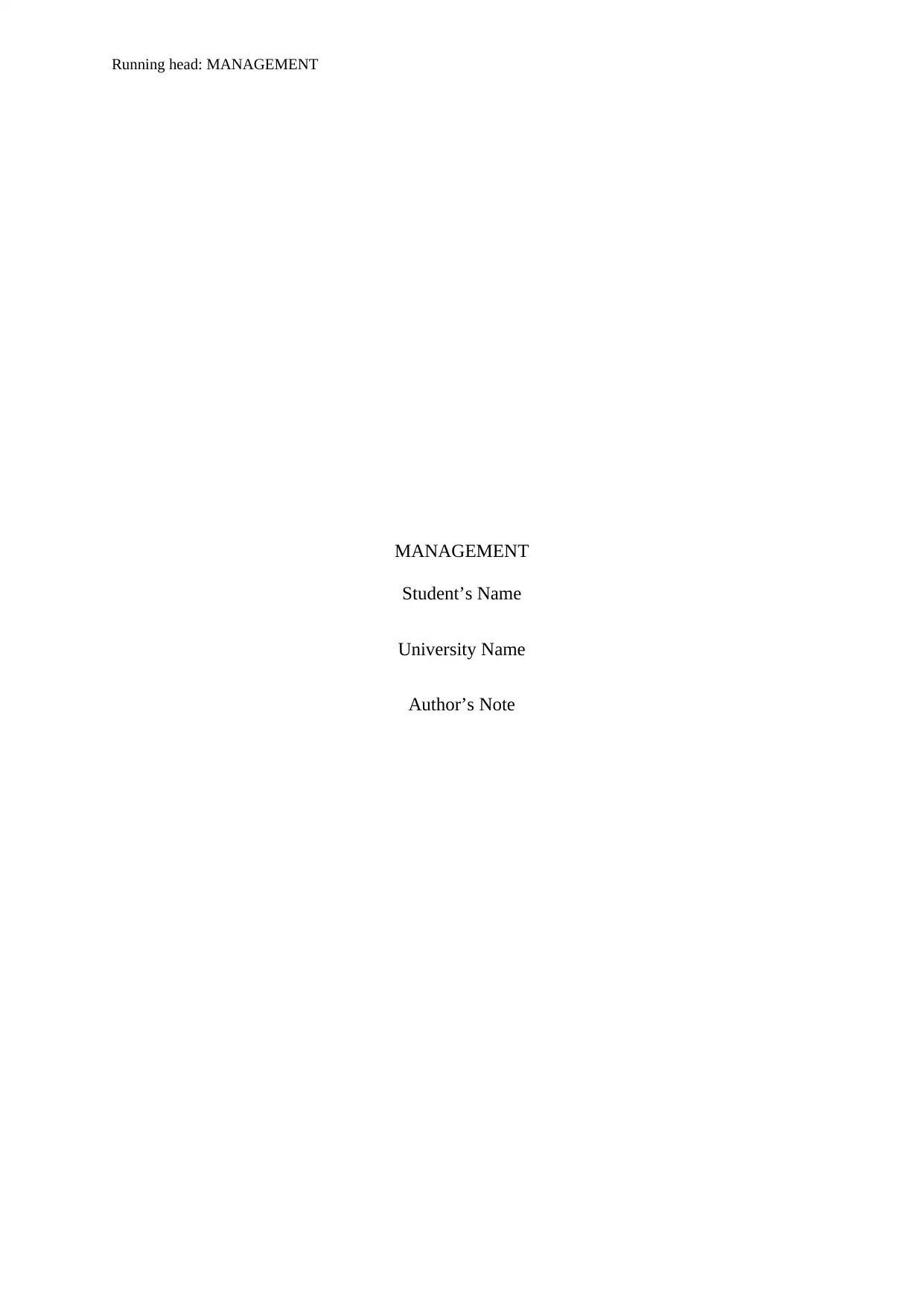
Running head: MANAGEMENT
MANAGEMENT
Student’s Name
University Name
Author’s Note
MANAGEMENT
Student’s Name
University Name
Author’s Note
Secure Best Marks with AI Grader
Need help grading? Try our AI Grader for instant feedback on your assignments.
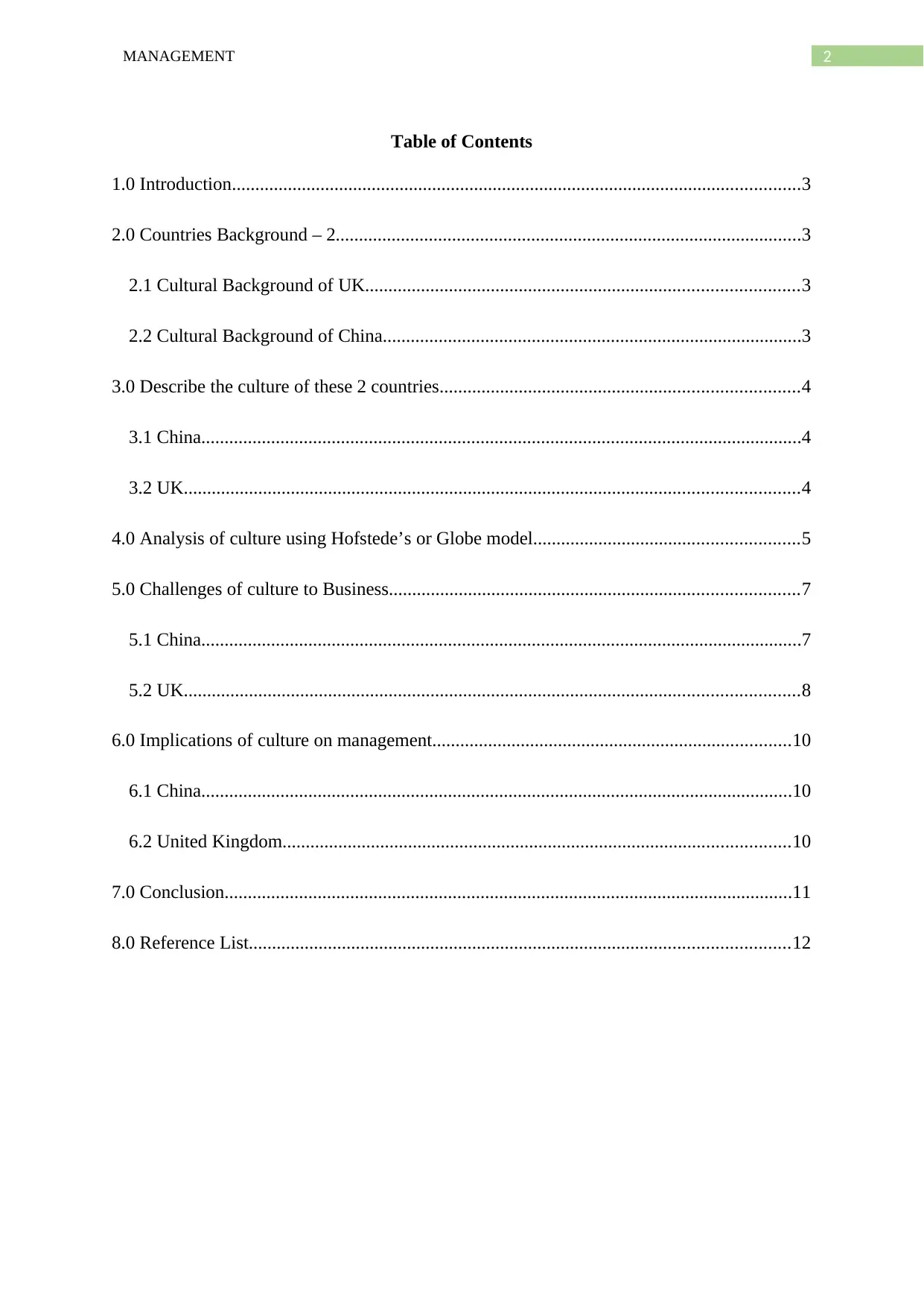
2MANAGEMENT
Table of Contents
1.0 Introduction..........................................................................................................................3
2.0 Countries Background – 2....................................................................................................3
2.1 Cultural Background of UK.............................................................................................3
2.2 Cultural Background of China..........................................................................................3
3.0 Describe the culture of these 2 countries.............................................................................4
3.1 China.................................................................................................................................4
3.2 UK....................................................................................................................................4
4.0 Analysis of culture using Hofstede’s or Globe model.........................................................5
5.0 Challenges of culture to Business........................................................................................7
5.1 China.................................................................................................................................7
5.2 UK....................................................................................................................................8
6.0 Implications of culture on management.............................................................................10
6.1 China...............................................................................................................................10
6.2 United Kingdom.............................................................................................................10
7.0 Conclusion..........................................................................................................................11
8.0 Reference List....................................................................................................................12
Table of Contents
1.0 Introduction..........................................................................................................................3
2.0 Countries Background – 2....................................................................................................3
2.1 Cultural Background of UK.............................................................................................3
2.2 Cultural Background of China..........................................................................................3
3.0 Describe the culture of these 2 countries.............................................................................4
3.1 China.................................................................................................................................4
3.2 UK....................................................................................................................................4
4.0 Analysis of culture using Hofstede’s or Globe model.........................................................5
5.0 Challenges of culture to Business........................................................................................7
5.1 China.................................................................................................................................7
5.2 UK....................................................................................................................................8
6.0 Implications of culture on management.............................................................................10
6.1 China...............................................................................................................................10
6.2 United Kingdom.............................................................................................................10
7.0 Conclusion..........................................................................................................................11
8.0 Reference List....................................................................................................................12
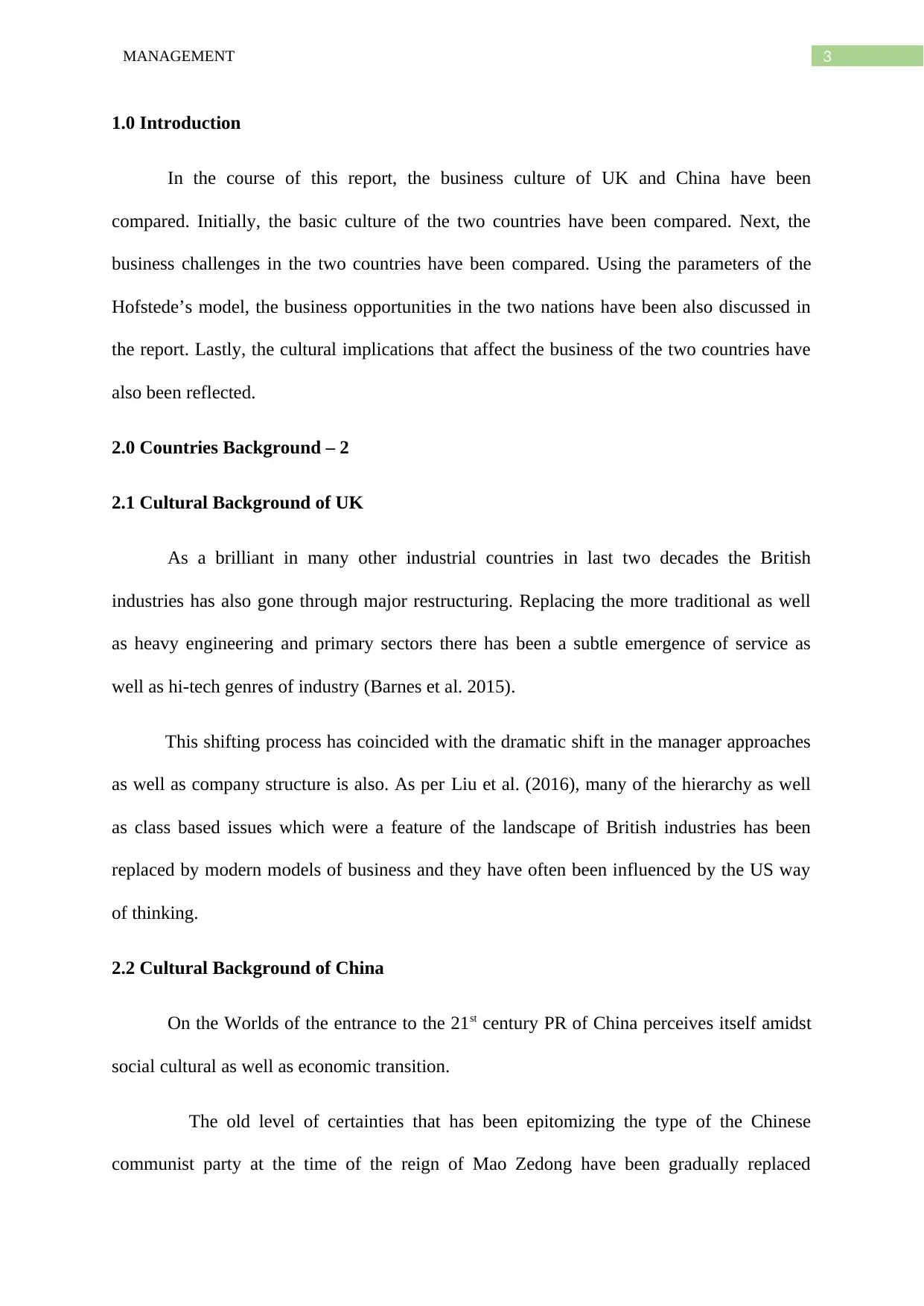
3MANAGEMENT
1.0 Introduction
In the course of this report, the business culture of UK and China have been
compared. Initially, the basic culture of the two countries have been compared. Next, the
business challenges in the two countries have been compared. Using the parameters of the
Hofstede’s model, the business opportunities in the two nations have been also discussed in
the report. Lastly, the cultural implications that affect the business of the two countries have
also been reflected.
2.0 Countries Background – 2
2.1 Cultural Background of UK
As a brilliant in many other industrial countries in last two decades the British
industries has also gone through major restructuring. Replacing the more traditional as well
as heavy engineering and primary sectors there has been a subtle emergence of service as
well as hi-tech genres of industry (Barnes et al. 2015).
This shifting process has coincided with the dramatic shift in the manager approaches
as well as company structure is also. As per Liu et al. (2016), many of the hierarchy as well
as class based issues which were a feature of the landscape of British industries has been
replaced by modern models of business and they have often been influenced by the US way
of thinking.
2.2 Cultural Background of China
On the Worlds of the entrance to the 21st century PR of China perceives itself amidst
social cultural as well as economic transition.
The old level of certainties that has been epitomizing the type of the Chinese
communist party at the time of the reign of Mao Zedong have been gradually replaced
1.0 Introduction
In the course of this report, the business culture of UK and China have been
compared. Initially, the basic culture of the two countries have been compared. Next, the
business challenges in the two countries have been compared. Using the parameters of the
Hofstede’s model, the business opportunities in the two nations have been also discussed in
the report. Lastly, the cultural implications that affect the business of the two countries have
also been reflected.
2.0 Countries Background – 2
2.1 Cultural Background of UK
As a brilliant in many other industrial countries in last two decades the British
industries has also gone through major restructuring. Replacing the more traditional as well
as heavy engineering and primary sectors there has been a subtle emergence of service as
well as hi-tech genres of industry (Barnes et al. 2015).
This shifting process has coincided with the dramatic shift in the manager approaches
as well as company structure is also. As per Liu et al. (2016), many of the hierarchy as well
as class based issues which were a feature of the landscape of British industries has been
replaced by modern models of business and they have often been influenced by the US way
of thinking.
2.2 Cultural Background of China
On the Worlds of the entrance to the 21st century PR of China perceives itself amidst
social cultural as well as economic transition.
The old level of certainties that has been epitomizing the type of the Chinese
communist party at the time of the reign of Mao Zedong have been gradually replaced
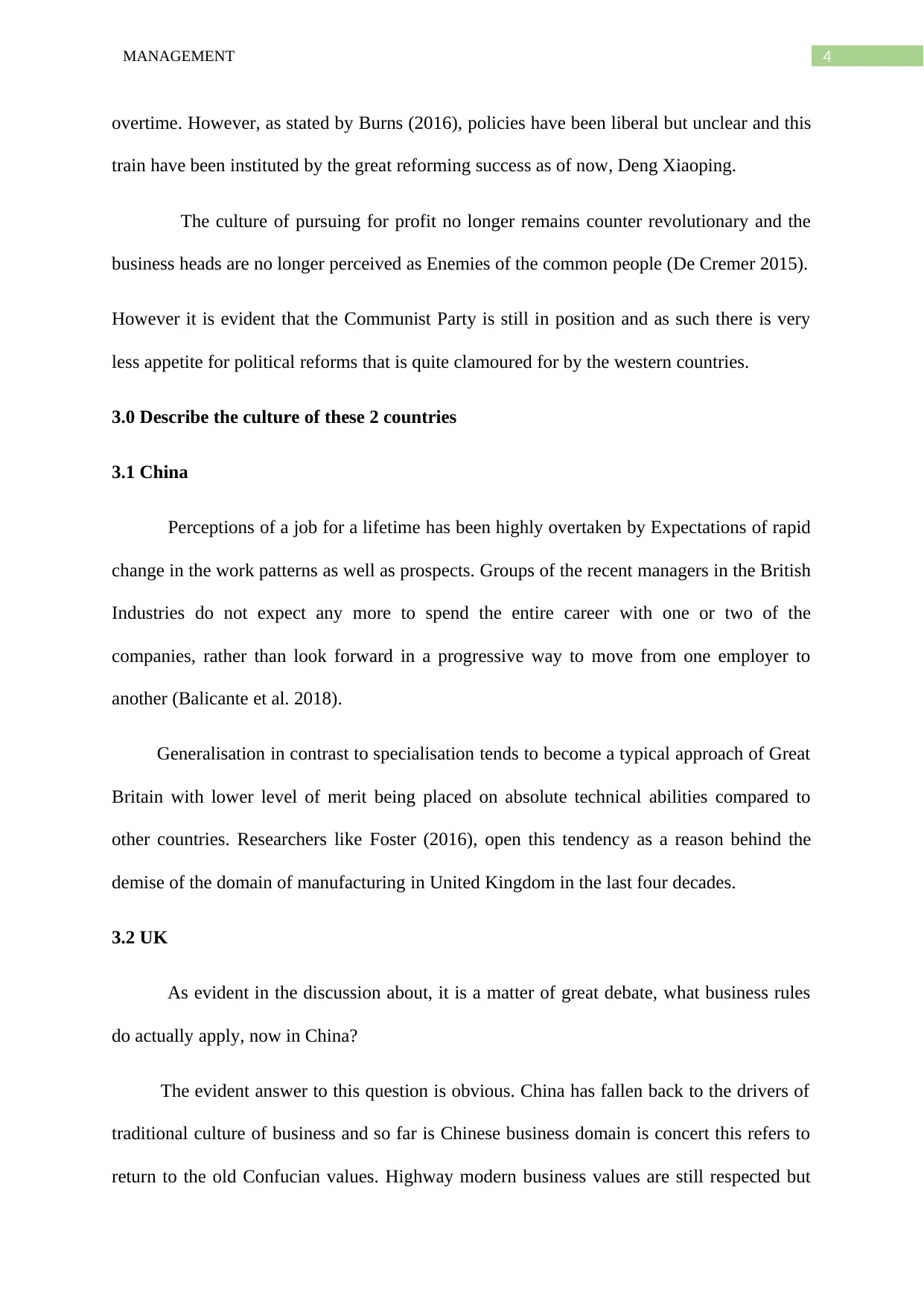
4MANAGEMENT
overtime. However, as stated by Burns (2016), policies have been liberal but unclear and this
train have been instituted by the great reforming success as of now, Deng Xiaoping.
The culture of pursuing for profit no longer remains counter revolutionary and the
business heads are no longer perceived as Enemies of the common people (De Cremer 2015).
However it is evident that the Communist Party is still in position and as such there is very
less appetite for political reforms that is quite clamoured for by the western countries.
3.0 Describe the culture of these 2 countries
3.1 China
Perceptions of a job for a lifetime has been highly overtaken by Expectations of rapid
change in the work patterns as well as prospects. Groups of the recent managers in the British
Industries do not expect any more to spend the entire career with one or two of the
companies, rather than look forward in a progressive way to move from one employer to
another (Balicante et al. 2018).
Generalisation in contrast to specialisation tends to become a typical approach of Great
Britain with lower level of merit being placed on absolute technical abilities compared to
other countries. Researchers like Foster (2016), open this tendency as a reason behind the
demise of the domain of manufacturing in United Kingdom in the last four decades.
3.2 UK
As evident in the discussion about, it is a matter of great debate, what business rules
do actually apply, now in China?
The evident answer to this question is obvious. China has fallen back to the drivers of
traditional culture of business and so far is Chinese business domain is concert this refers to
return to the old Confucian values. Highway modern business values are still respected but
overtime. However, as stated by Burns (2016), policies have been liberal but unclear and this
train have been instituted by the great reforming success as of now, Deng Xiaoping.
The culture of pursuing for profit no longer remains counter revolutionary and the
business heads are no longer perceived as Enemies of the common people (De Cremer 2015).
However it is evident that the Communist Party is still in position and as such there is very
less appetite for political reforms that is quite clamoured for by the western countries.
3.0 Describe the culture of these 2 countries
3.1 China
Perceptions of a job for a lifetime has been highly overtaken by Expectations of rapid
change in the work patterns as well as prospects. Groups of the recent managers in the British
Industries do not expect any more to spend the entire career with one or two of the
companies, rather than look forward in a progressive way to move from one employer to
another (Balicante et al. 2018).
Generalisation in contrast to specialisation tends to become a typical approach of Great
Britain with lower level of merit being placed on absolute technical abilities compared to
other countries. Researchers like Foster (2016), open this tendency as a reason behind the
demise of the domain of manufacturing in United Kingdom in the last four decades.
3.2 UK
As evident in the discussion about, it is a matter of great debate, what business rules
do actually apply, now in China?
The evident answer to this question is obvious. China has fallen back to the drivers of
traditional culture of business and so far is Chinese business domain is concert this refers to
return to the old Confucian values. Highway modern business values are still respected but
Secure Best Marks with AI Grader
Need help grading? Try our AI Grader for instant feedback on your assignments.
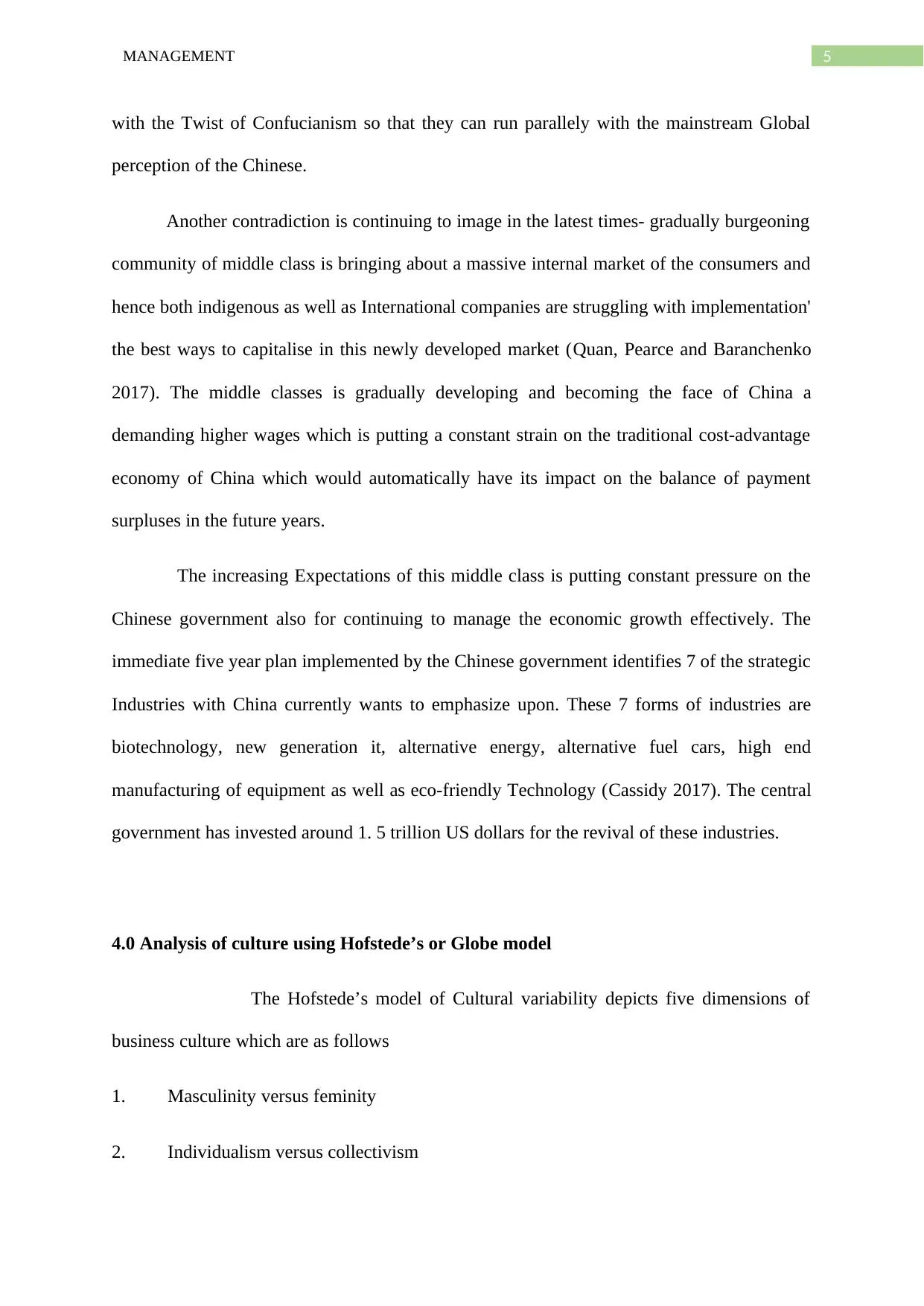
5MANAGEMENT
with the Twist of Confucianism so that they can run parallely with the mainstream Global
perception of the Chinese.
Another contradiction is continuing to image in the latest times- gradually burgeoning
community of middle class is bringing about a massive internal market of the consumers and
hence both indigenous as well as International companies are struggling with implementation'
the best ways to capitalise in this newly developed market (Quan, Pearce and Baranchenko
2017). The middle classes is gradually developing and becoming the face of China a
demanding higher wages which is putting a constant strain on the traditional cost-advantage
economy of China which would automatically have its impact on the balance of payment
surpluses in the future years.
The increasing Expectations of this middle class is putting constant pressure on the
Chinese government also for continuing to manage the economic growth effectively. The
immediate five year plan implemented by the Chinese government identifies 7 of the strategic
Industries with China currently wants to emphasize upon. These 7 forms of industries are
biotechnology, new generation it, alternative energy, alternative fuel cars, high end
manufacturing of equipment as well as eco-friendly Technology (Cassidy 2017). The central
government has invested around 1. 5 trillion US dollars for the revival of these industries.
4.0 Analysis of culture using Hofstede’s or Globe model
The Hofstede’s model of Cultural variability depicts five dimensions of
business culture which are as follows
1. Masculinity versus feminity
2. Individualism versus collectivism
with the Twist of Confucianism so that they can run parallely with the mainstream Global
perception of the Chinese.
Another contradiction is continuing to image in the latest times- gradually burgeoning
community of middle class is bringing about a massive internal market of the consumers and
hence both indigenous as well as International companies are struggling with implementation'
the best ways to capitalise in this newly developed market (Quan, Pearce and Baranchenko
2017). The middle classes is gradually developing and becoming the face of China a
demanding higher wages which is putting a constant strain on the traditional cost-advantage
economy of China which would automatically have its impact on the balance of payment
surpluses in the future years.
The increasing Expectations of this middle class is putting constant pressure on the
Chinese government also for continuing to manage the economic growth effectively. The
immediate five year plan implemented by the Chinese government identifies 7 of the strategic
Industries with China currently wants to emphasize upon. These 7 forms of industries are
biotechnology, new generation it, alternative energy, alternative fuel cars, high end
manufacturing of equipment as well as eco-friendly Technology (Cassidy 2017). The central
government has invested around 1. 5 trillion US dollars for the revival of these industries.
4.0 Analysis of culture using Hofstede’s or Globe model
The Hofstede’s model of Cultural variability depicts five dimensions of
business culture which are as follows
1. Masculinity versus feminity
2. Individualism versus collectivism
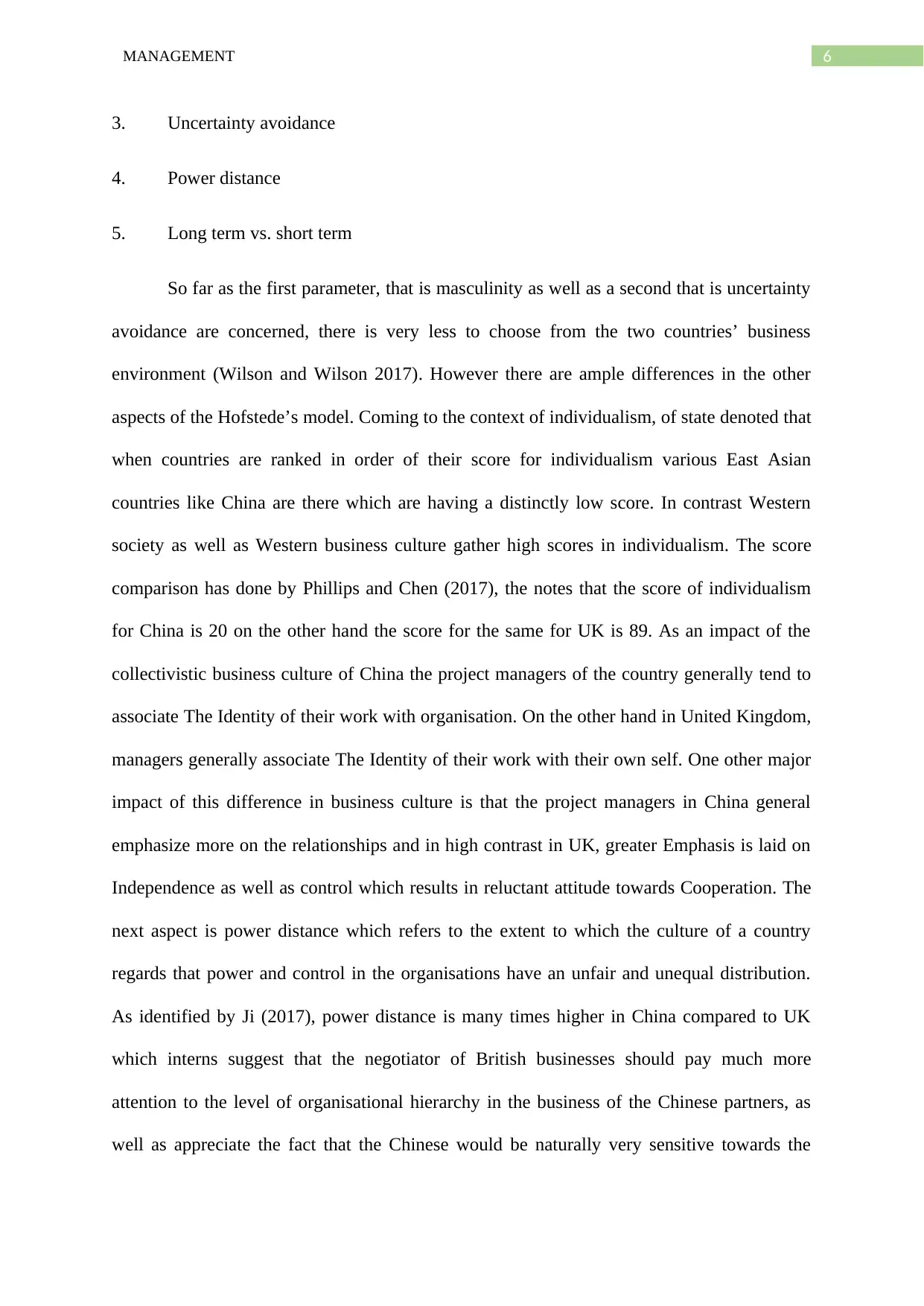
6MANAGEMENT
3. Uncertainty avoidance
4. Power distance
5. Long term vs. short term
So far as the first parameter, that is masculinity as well as a second that is uncertainty
avoidance are concerned, there is very less to choose from the two countries’ business
environment (Wilson and Wilson 2017). However there are ample differences in the other
aspects of the Hofstede’s model. Coming to the context of individualism, of state denoted that
when countries are ranked in order of their score for individualism various East Asian
countries like China are there which are having a distinctly low score. In contrast Western
society as well as Western business culture gather high scores in individualism. The score
comparison has done by Phillips and Chen (2017), the notes that the score of individualism
for China is 20 on the other hand the score for the same for UK is 89. As an impact of the
collectivistic business culture of China the project managers of the country generally tend to
associate The Identity of their work with organisation. On the other hand in United Kingdom,
managers generally associate The Identity of their work with their own self. One other major
impact of this difference in business culture is that the project managers in China general
emphasize more on the relationships and in high contrast in UK, greater Emphasis is laid on
Independence as well as control which results in reluctant attitude towards Cooperation. The
next aspect is power distance which refers to the extent to which the culture of a country
regards that power and control in the organisations have an unfair and unequal distribution.
As identified by Ji (2017), power distance is many times higher in China compared to UK
which interns suggest that the negotiator of British businesses should pay much more
attention to the level of organisational hierarchy in the business of the Chinese partners, as
well as appreciate the fact that the Chinese would be naturally very sensitive towards the
3. Uncertainty avoidance
4. Power distance
5. Long term vs. short term
So far as the first parameter, that is masculinity as well as a second that is uncertainty
avoidance are concerned, there is very less to choose from the two countries’ business
environment (Wilson and Wilson 2017). However there are ample differences in the other
aspects of the Hofstede’s model. Coming to the context of individualism, of state denoted that
when countries are ranked in order of their score for individualism various East Asian
countries like China are there which are having a distinctly low score. In contrast Western
society as well as Western business culture gather high scores in individualism. The score
comparison has done by Phillips and Chen (2017), the notes that the score of individualism
for China is 20 on the other hand the score for the same for UK is 89. As an impact of the
collectivistic business culture of China the project managers of the country generally tend to
associate The Identity of their work with organisation. On the other hand in United Kingdom,
managers generally associate The Identity of their work with their own self. One other major
impact of this difference in business culture is that the project managers in China general
emphasize more on the relationships and in high contrast in UK, greater Emphasis is laid on
Independence as well as control which results in reluctant attitude towards Cooperation. The
next aspect is power distance which refers to the extent to which the culture of a country
regards that power and control in the organisations have an unfair and unequal distribution.
As identified by Ji (2017), power distance is many times higher in China compared to UK
which interns suggest that the negotiator of British businesses should pay much more
attention to the level of organisational hierarchy in the business of the Chinese partners, as
well as appreciate the fact that the Chinese would be naturally very sensitive towards the
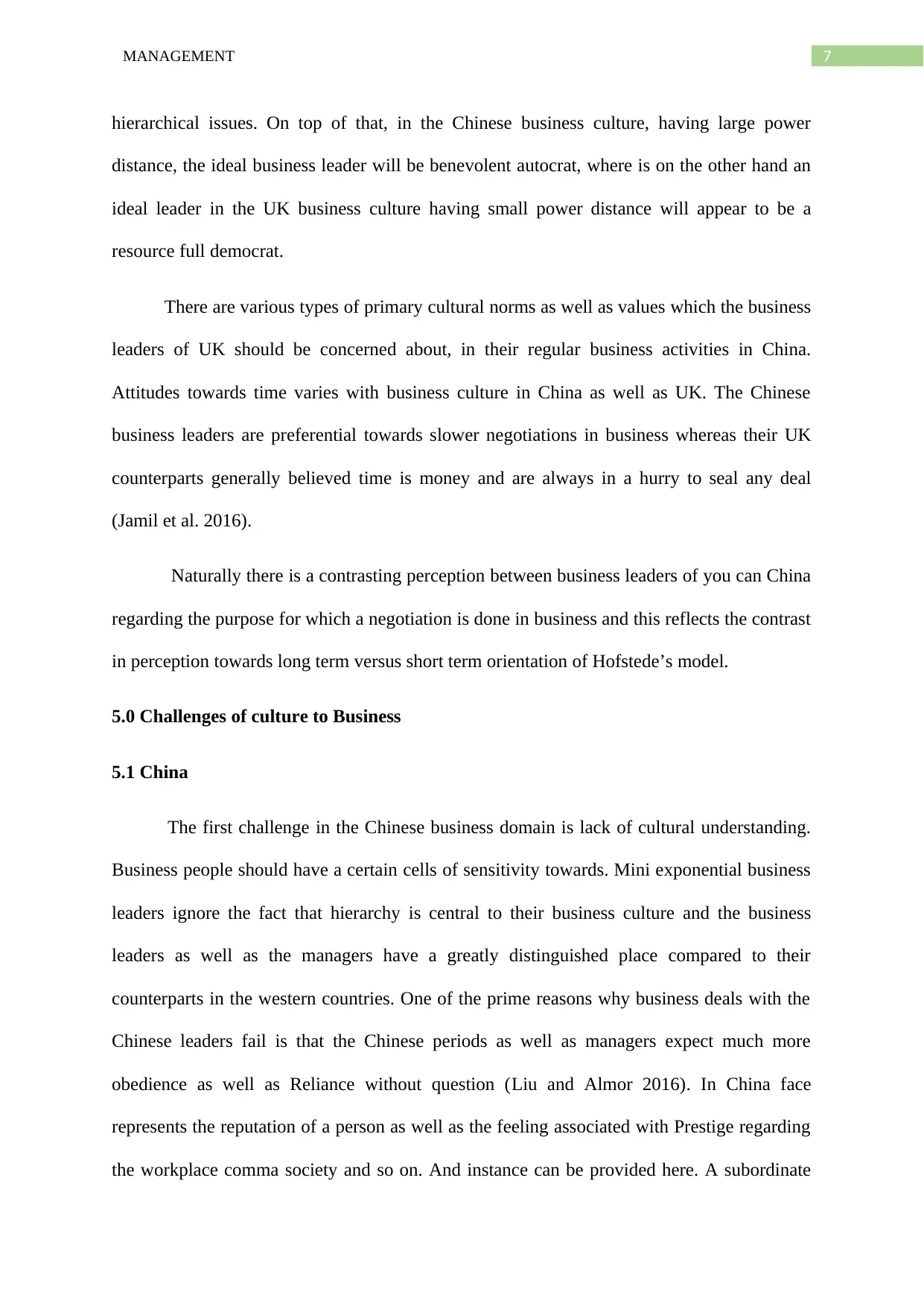
7MANAGEMENT
hierarchical issues. On top of that, in the Chinese business culture, having large power
distance, the ideal business leader will be benevolent autocrat, where is on the other hand an
ideal leader in the UK business culture having small power distance will appear to be a
resource full democrat.
There are various types of primary cultural norms as well as values which the business
leaders of UK should be concerned about, in their regular business activities in China.
Attitudes towards time varies with business culture in China as well as UK. The Chinese
business leaders are preferential towards slower negotiations in business whereas their UK
counterparts generally believed time is money and are always in a hurry to seal any deal
(Jamil et al. 2016).
Naturally there is a contrasting perception between business leaders of you can China
regarding the purpose for which a negotiation is done in business and this reflects the contrast
in perception towards long term versus short term orientation of Hofstede’s model.
5.0 Challenges of culture to Business
5.1 China
The first challenge in the Chinese business domain is lack of cultural understanding.
Business people should have a certain cells of sensitivity towards. Mini exponential business
leaders ignore the fact that hierarchy is central to their business culture and the business
leaders as well as the managers have a greatly distinguished place compared to their
counterparts in the western countries. One of the prime reasons why business deals with the
Chinese leaders fail is that the Chinese periods as well as managers expect much more
obedience as well as Reliance without question (Liu and Almor 2016). In China face
represents the reputation of a person as well as the feeling associated with Prestige regarding
the workplace comma society and so on. And instance can be provided here. A subordinate
hierarchical issues. On top of that, in the Chinese business culture, having large power
distance, the ideal business leader will be benevolent autocrat, where is on the other hand an
ideal leader in the UK business culture having small power distance will appear to be a
resource full democrat.
There are various types of primary cultural norms as well as values which the business
leaders of UK should be concerned about, in their regular business activities in China.
Attitudes towards time varies with business culture in China as well as UK. The Chinese
business leaders are preferential towards slower negotiations in business whereas their UK
counterparts generally believed time is money and are always in a hurry to seal any deal
(Jamil et al. 2016).
Naturally there is a contrasting perception between business leaders of you can China
regarding the purpose for which a negotiation is done in business and this reflects the contrast
in perception towards long term versus short term orientation of Hofstede’s model.
5.0 Challenges of culture to Business
5.1 China
The first challenge in the Chinese business domain is lack of cultural understanding.
Business people should have a certain cells of sensitivity towards. Mini exponential business
leaders ignore the fact that hierarchy is central to their business culture and the business
leaders as well as the managers have a greatly distinguished place compared to their
counterparts in the western countries. One of the prime reasons why business deals with the
Chinese leaders fail is that the Chinese periods as well as managers expect much more
obedience as well as Reliance without question (Liu and Almor 2016). In China face
represents the reputation of a person as well as the feeling associated with Prestige regarding
the workplace comma society and so on. And instance can be provided here. A subordinate
Paraphrase This Document
Need a fresh take? Get an instant paraphrase of this document with our AI Paraphraser
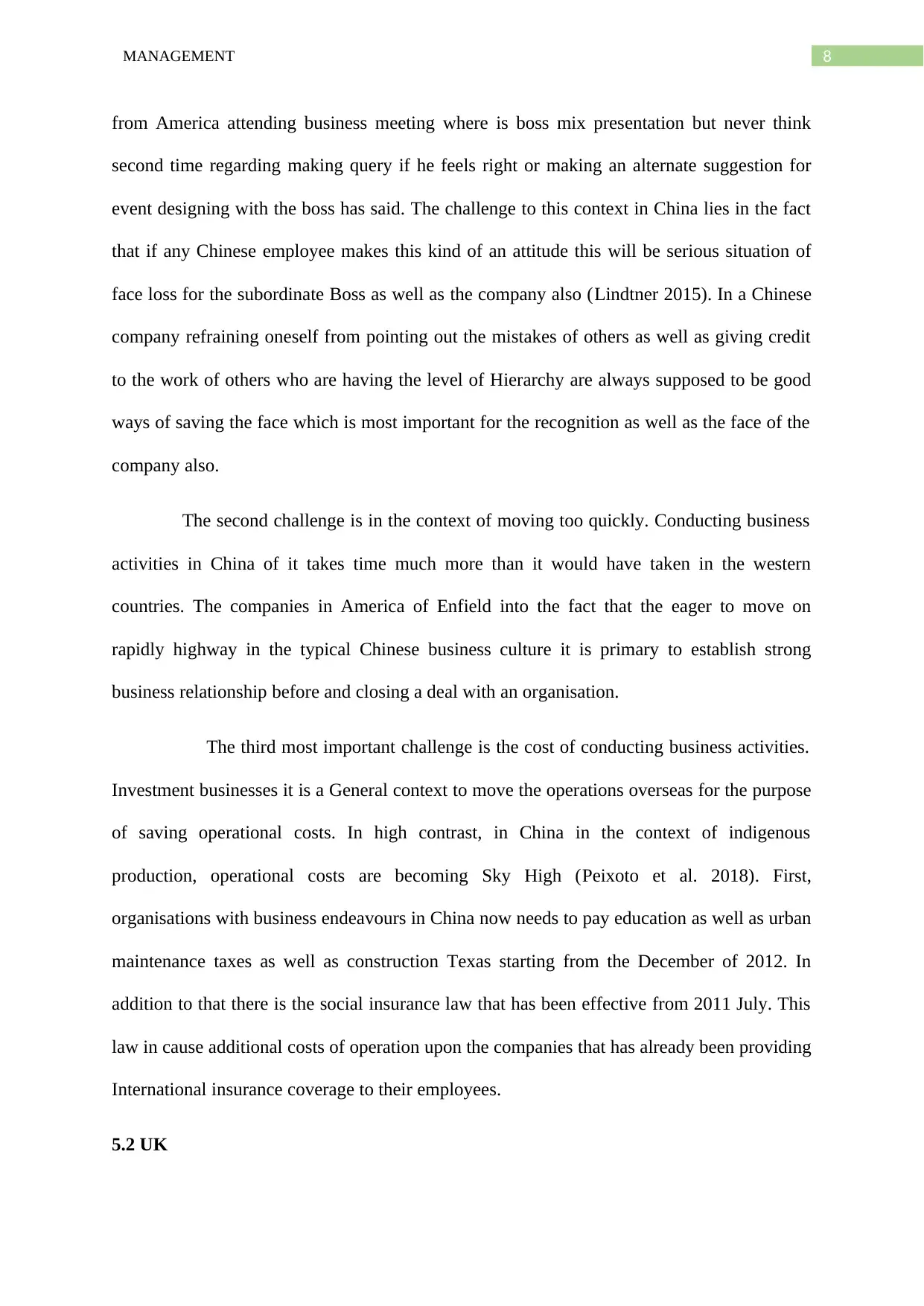
8MANAGEMENT
from America attending business meeting where is boss mix presentation but never think
second time regarding making query if he feels right or making an alternate suggestion for
event designing with the boss has said. The challenge to this context in China lies in the fact
that if any Chinese employee makes this kind of an attitude this will be serious situation of
face loss for the subordinate Boss as well as the company also (Lindtner 2015). In a Chinese
company refraining oneself from pointing out the mistakes of others as well as giving credit
to the work of others who are having the level of Hierarchy are always supposed to be good
ways of saving the face which is most important for the recognition as well as the face of the
company also.
The second challenge is in the context of moving too quickly. Conducting business
activities in China of it takes time much more than it would have taken in the western
countries. The companies in America of Enfield into the fact that the eager to move on
rapidly highway in the typical Chinese business culture it is primary to establish strong
business relationship before and closing a deal with an organisation.
The third most important challenge is the cost of conducting business activities.
Investment businesses it is a General context to move the operations overseas for the purpose
of saving operational costs. In high contrast, in China in the context of indigenous
production, operational costs are becoming Sky High (Peixoto et al. 2018). First,
organisations with business endeavours in China now needs to pay education as well as urban
maintenance taxes as well as construction Texas starting from the December of 2012. In
addition to that there is the social insurance law that has been effective from 2011 July. This
law in cause additional costs of operation upon the companies that has already been providing
International insurance coverage to their employees.
5.2 UK
from America attending business meeting where is boss mix presentation but never think
second time regarding making query if he feels right or making an alternate suggestion for
event designing with the boss has said. The challenge to this context in China lies in the fact
that if any Chinese employee makes this kind of an attitude this will be serious situation of
face loss for the subordinate Boss as well as the company also (Lindtner 2015). In a Chinese
company refraining oneself from pointing out the mistakes of others as well as giving credit
to the work of others who are having the level of Hierarchy are always supposed to be good
ways of saving the face which is most important for the recognition as well as the face of the
company also.
The second challenge is in the context of moving too quickly. Conducting business
activities in China of it takes time much more than it would have taken in the western
countries. The companies in America of Enfield into the fact that the eager to move on
rapidly highway in the typical Chinese business culture it is primary to establish strong
business relationship before and closing a deal with an organisation.
The third most important challenge is the cost of conducting business activities.
Investment businesses it is a General context to move the operations overseas for the purpose
of saving operational costs. In high contrast, in China in the context of indigenous
production, operational costs are becoming Sky High (Peixoto et al. 2018). First,
organisations with business endeavours in China now needs to pay education as well as urban
maintenance taxes as well as construction Texas starting from the December of 2012. In
addition to that there is the social insurance law that has been effective from 2011 July. This
law in cause additional costs of operation upon the companies that has already been providing
International insurance coverage to their employees.
5.2 UK
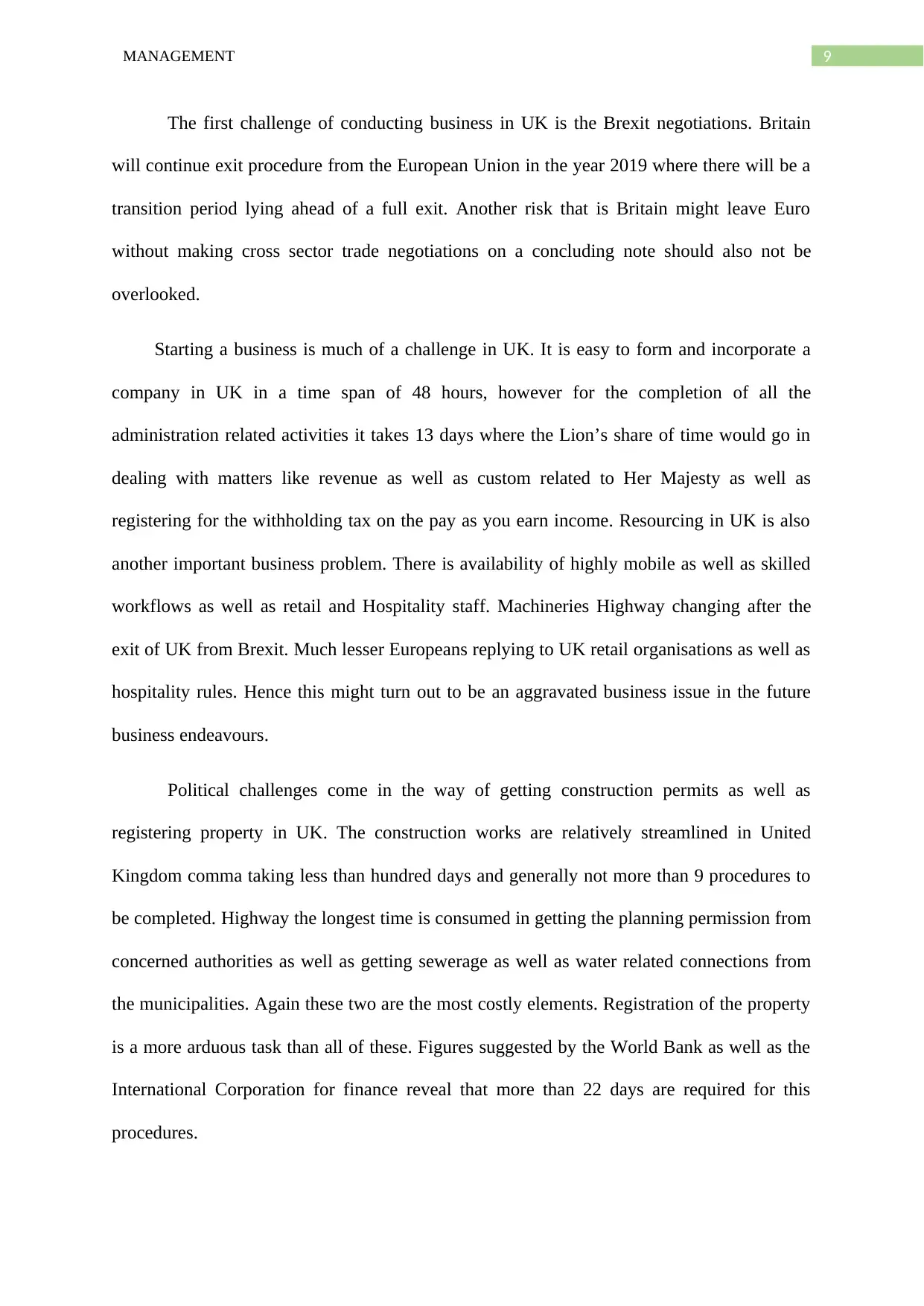
9MANAGEMENT
The first challenge of conducting business in UK is the Brexit negotiations. Britain
will continue exit procedure from the European Union in the year 2019 where there will be a
transition period lying ahead of a full exit. Another risk that is Britain might leave Euro
without making cross sector trade negotiations on a concluding note should also not be
overlooked.
Starting a business is much of a challenge in UK. It is easy to form and incorporate a
company in UK in a time span of 48 hours, however for the completion of all the
administration related activities it takes 13 days where the Lion’s share of time would go in
dealing with matters like revenue as well as custom related to Her Majesty as well as
registering for the withholding tax on the pay as you earn income. Resourcing in UK is also
another important business problem. There is availability of highly mobile as well as skilled
workflows as well as retail and Hospitality staff. Machineries Highway changing after the
exit of UK from Brexit. Much lesser Europeans replying to UK retail organisations as well as
hospitality rules. Hence this might turn out to be an aggravated business issue in the future
business endeavours.
Political challenges come in the way of getting construction permits as well as
registering property in UK. The construction works are relatively streamlined in United
Kingdom comma taking less than hundred days and generally not more than 9 procedures to
be completed. Highway the longest time is consumed in getting the planning permission from
concerned authorities as well as getting sewerage as well as water related connections from
the municipalities. Again these two are the most costly elements. Registration of the property
is a more arduous task than all of these. Figures suggested by the World Bank as well as the
International Corporation for finance reveal that more than 22 days are required for this
procedures.
The first challenge of conducting business in UK is the Brexit negotiations. Britain
will continue exit procedure from the European Union in the year 2019 where there will be a
transition period lying ahead of a full exit. Another risk that is Britain might leave Euro
without making cross sector trade negotiations on a concluding note should also not be
overlooked.
Starting a business is much of a challenge in UK. It is easy to form and incorporate a
company in UK in a time span of 48 hours, however for the completion of all the
administration related activities it takes 13 days where the Lion’s share of time would go in
dealing with matters like revenue as well as custom related to Her Majesty as well as
registering for the withholding tax on the pay as you earn income. Resourcing in UK is also
another important business problem. There is availability of highly mobile as well as skilled
workflows as well as retail and Hospitality staff. Machineries Highway changing after the
exit of UK from Brexit. Much lesser Europeans replying to UK retail organisations as well as
hospitality rules. Hence this might turn out to be an aggravated business issue in the future
business endeavours.
Political challenges come in the way of getting construction permits as well as
registering property in UK. The construction works are relatively streamlined in United
Kingdom comma taking less than hundred days and generally not more than 9 procedures to
be completed. Highway the longest time is consumed in getting the planning permission from
concerned authorities as well as getting sewerage as well as water related connections from
the municipalities. Again these two are the most costly elements. Registration of the property
is a more arduous task than all of these. Figures suggested by the World Bank as well as the
International Corporation for finance reveal that more than 22 days are required for this
procedures.
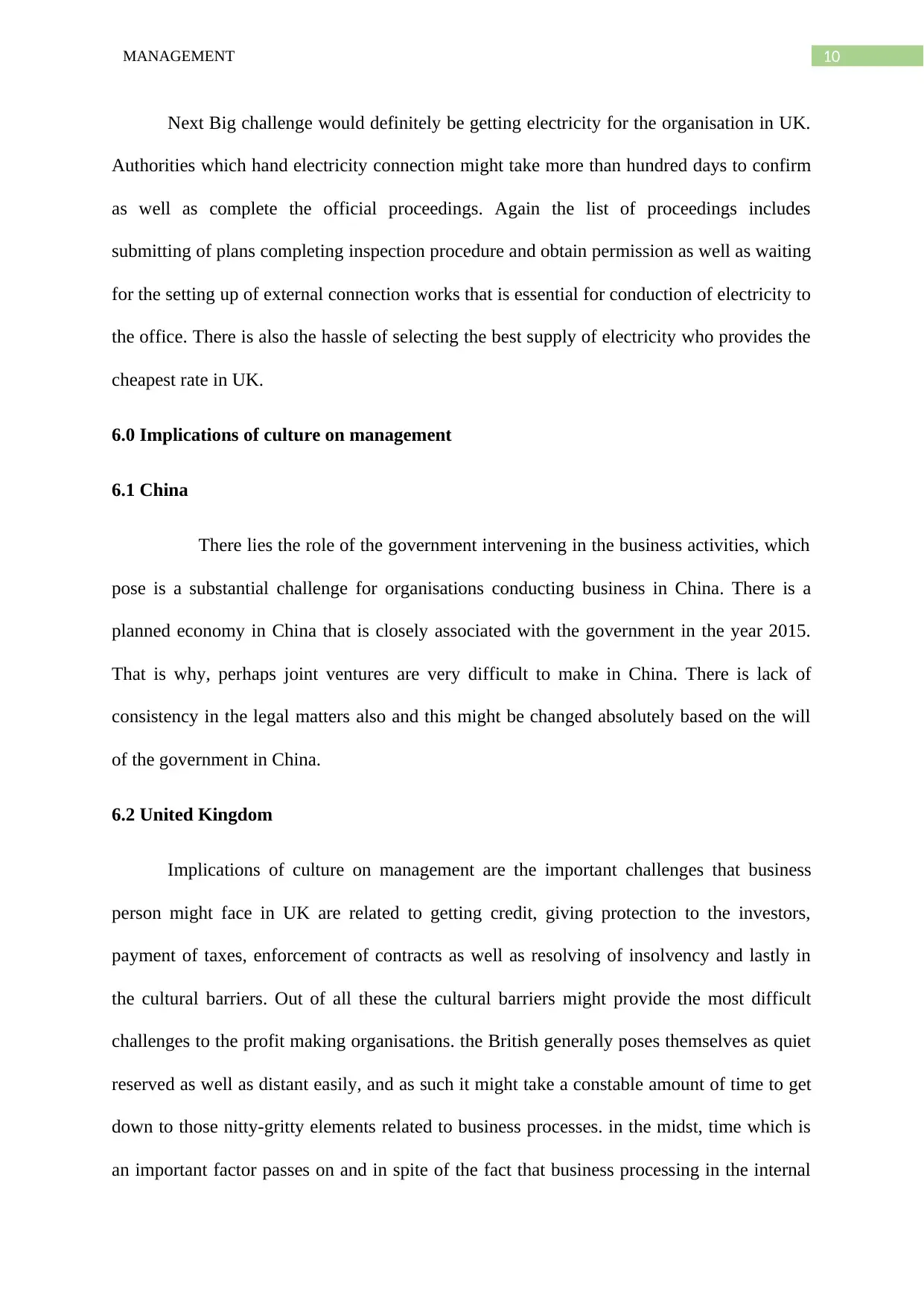
10MANAGEMENT
Next Big challenge would definitely be getting electricity for the organisation in UK.
Authorities which hand electricity connection might take more than hundred days to confirm
as well as complete the official proceedings. Again the list of proceedings includes
submitting of plans completing inspection procedure and obtain permission as well as waiting
for the setting up of external connection works that is essential for conduction of electricity to
the office. There is also the hassle of selecting the best supply of electricity who provides the
cheapest rate in UK.
6.0 Implications of culture on management
6.1 China
There lies the role of the government intervening in the business activities, which
pose is a substantial challenge for organisations conducting business in China. There is a
planned economy in China that is closely associated with the government in the year 2015.
That is why, perhaps joint ventures are very difficult to make in China. There is lack of
consistency in the legal matters also and this might be changed absolutely based on the will
of the government in China.
6.2 United Kingdom
Implications of culture on management are the important challenges that business
person might face in UK are related to getting credit, giving protection to the investors,
payment of taxes, enforcement of contracts as well as resolving of insolvency and lastly in
the cultural barriers. Out of all these the cultural barriers might provide the most difficult
challenges to the profit making organisations. the British generally poses themselves as quiet
reserved as well as distant easily, and as such it might take a constable amount of time to get
down to those nitty-gritty elements related to business processes. in the midst, time which is
an important factor passes on and in spite of the fact that business processing in the internal
Next Big challenge would definitely be getting electricity for the organisation in UK.
Authorities which hand electricity connection might take more than hundred days to confirm
as well as complete the official proceedings. Again the list of proceedings includes
submitting of plans completing inspection procedure and obtain permission as well as waiting
for the setting up of external connection works that is essential for conduction of electricity to
the office. There is also the hassle of selecting the best supply of electricity who provides the
cheapest rate in UK.
6.0 Implications of culture on management
6.1 China
There lies the role of the government intervening in the business activities, which
pose is a substantial challenge for organisations conducting business in China. There is a
planned economy in China that is closely associated with the government in the year 2015.
That is why, perhaps joint ventures are very difficult to make in China. There is lack of
consistency in the legal matters also and this might be changed absolutely based on the will
of the government in China.
6.2 United Kingdom
Implications of culture on management are the important challenges that business
person might face in UK are related to getting credit, giving protection to the investors,
payment of taxes, enforcement of contracts as well as resolving of insolvency and lastly in
the cultural barriers. Out of all these the cultural barriers might provide the most difficult
challenges to the profit making organisations. the British generally poses themselves as quiet
reserved as well as distant easily, and as such it might take a constable amount of time to get
down to those nitty-gritty elements related to business processes. in the midst, time which is
an important factor passes on and in spite of the fact that business processing in the internal
Secure Best Marks with AI Grader
Need help grading? Try our AI Grader for instant feedback on your assignments.
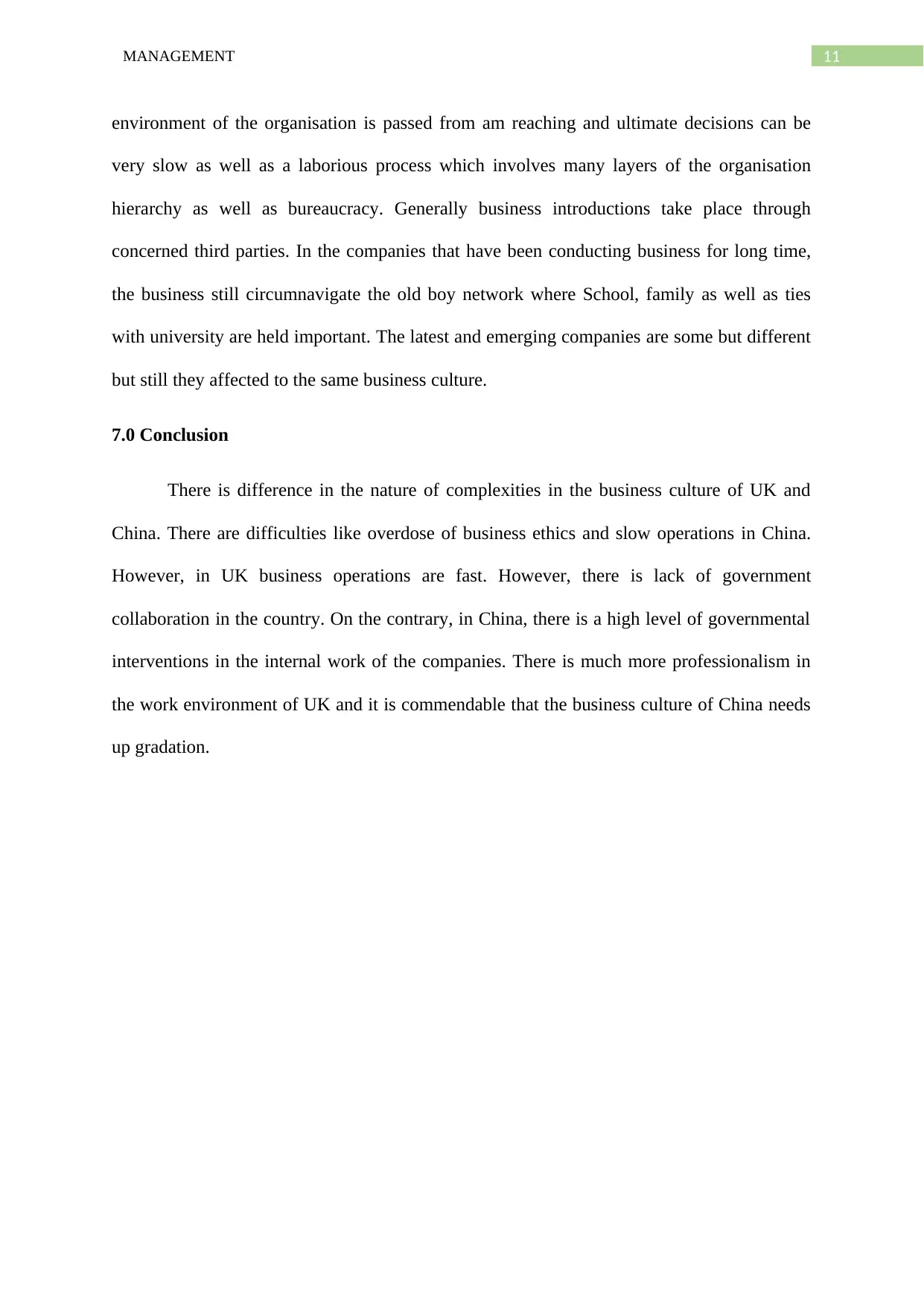
11MANAGEMENT
environment of the organisation is passed from am reaching and ultimate decisions can be
very slow as well as a laborious process which involves many layers of the organisation
hierarchy as well as bureaucracy. Generally business introductions take place through
concerned third parties. In the companies that have been conducting business for long time,
the business still circumnavigate the old boy network where School, family as well as ties
with university are held important. The latest and emerging companies are some but different
but still they affected to the same business culture.
7.0 Conclusion
There is difference in the nature of complexities in the business culture of UK and
China. There are difficulties like overdose of business ethics and slow operations in China.
However, in UK business operations are fast. However, there is lack of government
collaboration in the country. On the contrary, in China, there is a high level of governmental
interventions in the internal work of the companies. There is much more professionalism in
the work environment of UK and it is commendable that the business culture of China needs
up gradation.
environment of the organisation is passed from am reaching and ultimate decisions can be
very slow as well as a laborious process which involves many layers of the organisation
hierarchy as well as bureaucracy. Generally business introductions take place through
concerned third parties. In the companies that have been conducting business for long time,
the business still circumnavigate the old boy network where School, family as well as ties
with university are held important. The latest and emerging companies are some but different
but still they affected to the same business culture.
7.0 Conclusion
There is difference in the nature of complexities in the business culture of UK and
China. There are difficulties like overdose of business ethics and slow operations in China.
However, in UK business operations are fast. However, there is lack of government
collaboration in the country. On the contrary, in China, there is a high level of governmental
interventions in the internal work of the companies. There is much more professionalism in
the work environment of UK and it is commendable that the business culture of China needs
up gradation.
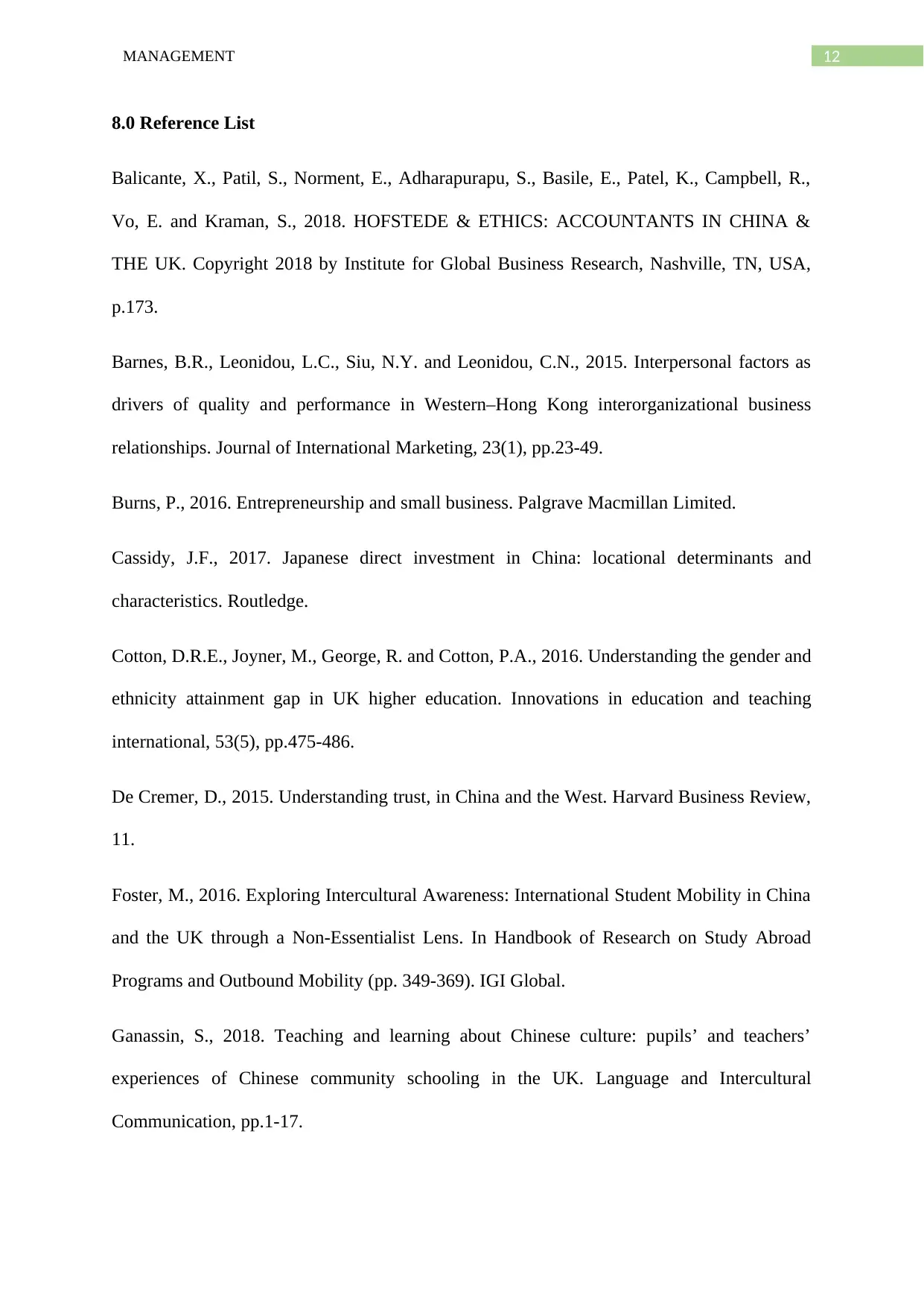
12MANAGEMENT
8.0 Reference List
Balicante, X., Patil, S., Norment, E., Adharapurapu, S., Basile, E., Patel, K., Campbell, R.,
Vo, E. and Kraman, S., 2018. HOFSTEDE & ETHICS: ACCOUNTANTS IN CHINA &
THE UK. Copyright 2018 by Institute for Global Business Research, Nashville, TN, USA,
p.173.
Barnes, B.R., Leonidou, L.C., Siu, N.Y. and Leonidou, C.N., 2015. Interpersonal factors as
drivers of quality and performance in Western–Hong Kong interorganizational business
relationships. Journal of International Marketing, 23(1), pp.23-49.
Burns, P., 2016. Entrepreneurship and small business. Palgrave Macmillan Limited.
Cassidy, J.F., 2017. Japanese direct investment in China: locational determinants and
characteristics. Routledge.
Cotton, D.R.E., Joyner, M., George, R. and Cotton, P.A., 2016. Understanding the gender and
ethnicity attainment gap in UK higher education. Innovations in education and teaching
international, 53(5), pp.475-486.
De Cremer, D., 2015. Understanding trust, in China and the West. Harvard Business Review,
11.
Foster, M., 2016. Exploring Intercultural Awareness: International Student Mobility in China
and the UK through a Non-Essentialist Lens. In Handbook of Research on Study Abroad
Programs and Outbound Mobility (pp. 349-369). IGI Global.
Ganassin, S., 2018. Teaching and learning about Chinese culture: pupils’ and teachers’
experiences of Chinese community schooling in the UK. Language and Intercultural
Communication, pp.1-17.
8.0 Reference List
Balicante, X., Patil, S., Norment, E., Adharapurapu, S., Basile, E., Patel, K., Campbell, R.,
Vo, E. and Kraman, S., 2018. HOFSTEDE & ETHICS: ACCOUNTANTS IN CHINA &
THE UK. Copyright 2018 by Institute for Global Business Research, Nashville, TN, USA,
p.173.
Barnes, B.R., Leonidou, L.C., Siu, N.Y. and Leonidou, C.N., 2015. Interpersonal factors as
drivers of quality and performance in Western–Hong Kong interorganizational business
relationships. Journal of International Marketing, 23(1), pp.23-49.
Burns, P., 2016. Entrepreneurship and small business. Palgrave Macmillan Limited.
Cassidy, J.F., 2017. Japanese direct investment in China: locational determinants and
characteristics. Routledge.
Cotton, D.R.E., Joyner, M., George, R. and Cotton, P.A., 2016. Understanding the gender and
ethnicity attainment gap in UK higher education. Innovations in education and teaching
international, 53(5), pp.475-486.
De Cremer, D., 2015. Understanding trust, in China and the West. Harvard Business Review,
11.
Foster, M., 2016. Exploring Intercultural Awareness: International Student Mobility in China
and the UK through a Non-Essentialist Lens. In Handbook of Research on Study Abroad
Programs and Outbound Mobility (pp. 349-369). IGI Global.
Ganassin, S., 2018. Teaching and learning about Chinese culture: pupils’ and teachers’
experiences of Chinese community schooling in the UK. Language and Intercultural
Communication, pp.1-17.
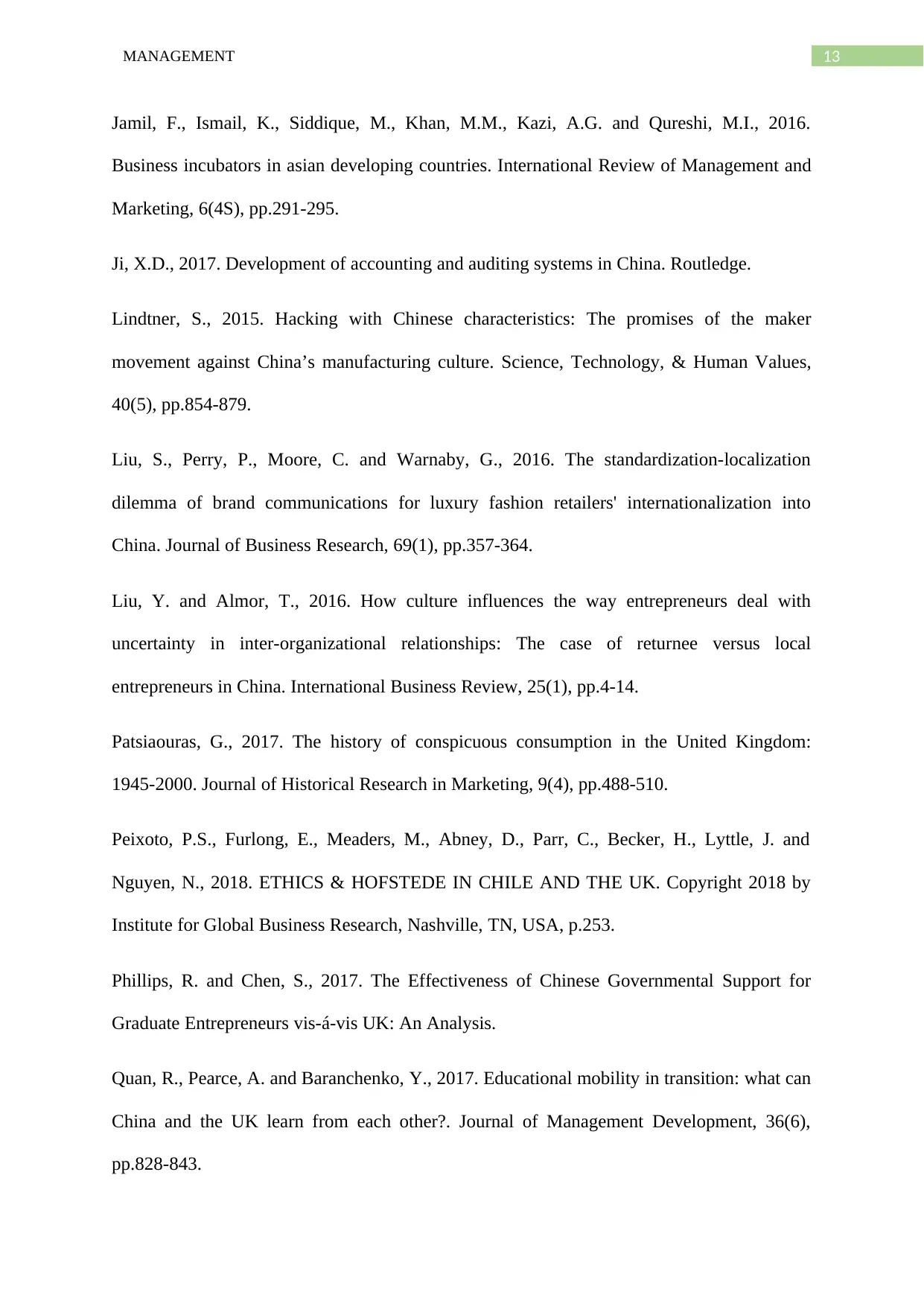
13MANAGEMENT
Jamil, F., Ismail, K., Siddique, M., Khan, M.M., Kazi, A.G. and Qureshi, M.I., 2016.
Business incubators in asian developing countries. International Review of Management and
Marketing, 6(4S), pp.291-295.
Ji, X.D., 2017. Development of accounting and auditing systems in China. Routledge.
Lindtner, S., 2015. Hacking with Chinese characteristics: The promises of the maker
movement against China’s manufacturing culture. Science, Technology, & Human Values,
40(5), pp.854-879.
Liu, S., Perry, P., Moore, C. and Warnaby, G., 2016. The standardization-localization
dilemma of brand communications for luxury fashion retailers' internationalization into
China. Journal of Business Research, 69(1), pp.357-364.
Liu, Y. and Almor, T., 2016. How culture influences the way entrepreneurs deal with
uncertainty in inter-organizational relationships: The case of returnee versus local
entrepreneurs in China. International Business Review, 25(1), pp.4-14.
Patsiaouras, G., 2017. The history of conspicuous consumption in the United Kingdom:
1945-2000. Journal of Historical Research in Marketing, 9(4), pp.488-510.
Peixoto, P.S., Furlong, E., Meaders, M., Abney, D., Parr, C., Becker, H., Lyttle, J. and
Nguyen, N., 2018. ETHICS & HOFSTEDE IN CHILE AND THE UK. Copyright 2018 by
Institute for Global Business Research, Nashville, TN, USA, p.253.
Phillips, R. and Chen, S., 2017. The Effectiveness of Chinese Governmental Support for
Graduate Entrepreneurs vis-á-vis UK: An Analysis.
Quan, R., Pearce, A. and Baranchenko, Y., 2017. Educational mobility in transition: what can
China and the UK learn from each other?. Journal of Management Development, 36(6),
pp.828-843.
Jamil, F., Ismail, K., Siddique, M., Khan, M.M., Kazi, A.G. and Qureshi, M.I., 2016.
Business incubators in asian developing countries. International Review of Management and
Marketing, 6(4S), pp.291-295.
Ji, X.D., 2017. Development of accounting and auditing systems in China. Routledge.
Lindtner, S., 2015. Hacking with Chinese characteristics: The promises of the maker
movement against China’s manufacturing culture. Science, Technology, & Human Values,
40(5), pp.854-879.
Liu, S., Perry, P., Moore, C. and Warnaby, G., 2016. The standardization-localization
dilemma of brand communications for luxury fashion retailers' internationalization into
China. Journal of Business Research, 69(1), pp.357-364.
Liu, Y. and Almor, T., 2016. How culture influences the way entrepreneurs deal with
uncertainty in inter-organizational relationships: The case of returnee versus local
entrepreneurs in China. International Business Review, 25(1), pp.4-14.
Patsiaouras, G., 2017. The history of conspicuous consumption in the United Kingdom:
1945-2000. Journal of Historical Research in Marketing, 9(4), pp.488-510.
Peixoto, P.S., Furlong, E., Meaders, M., Abney, D., Parr, C., Becker, H., Lyttle, J. and
Nguyen, N., 2018. ETHICS & HOFSTEDE IN CHILE AND THE UK. Copyright 2018 by
Institute for Global Business Research, Nashville, TN, USA, p.253.
Phillips, R. and Chen, S., 2017. The Effectiveness of Chinese Governmental Support for
Graduate Entrepreneurs vis-á-vis UK: An Analysis.
Quan, R., Pearce, A. and Baranchenko, Y., 2017. Educational mobility in transition: what can
China and the UK learn from each other?. Journal of Management Development, 36(6),
pp.828-843.
Paraphrase This Document
Need a fresh take? Get an instant paraphrase of this document with our AI Paraphraser
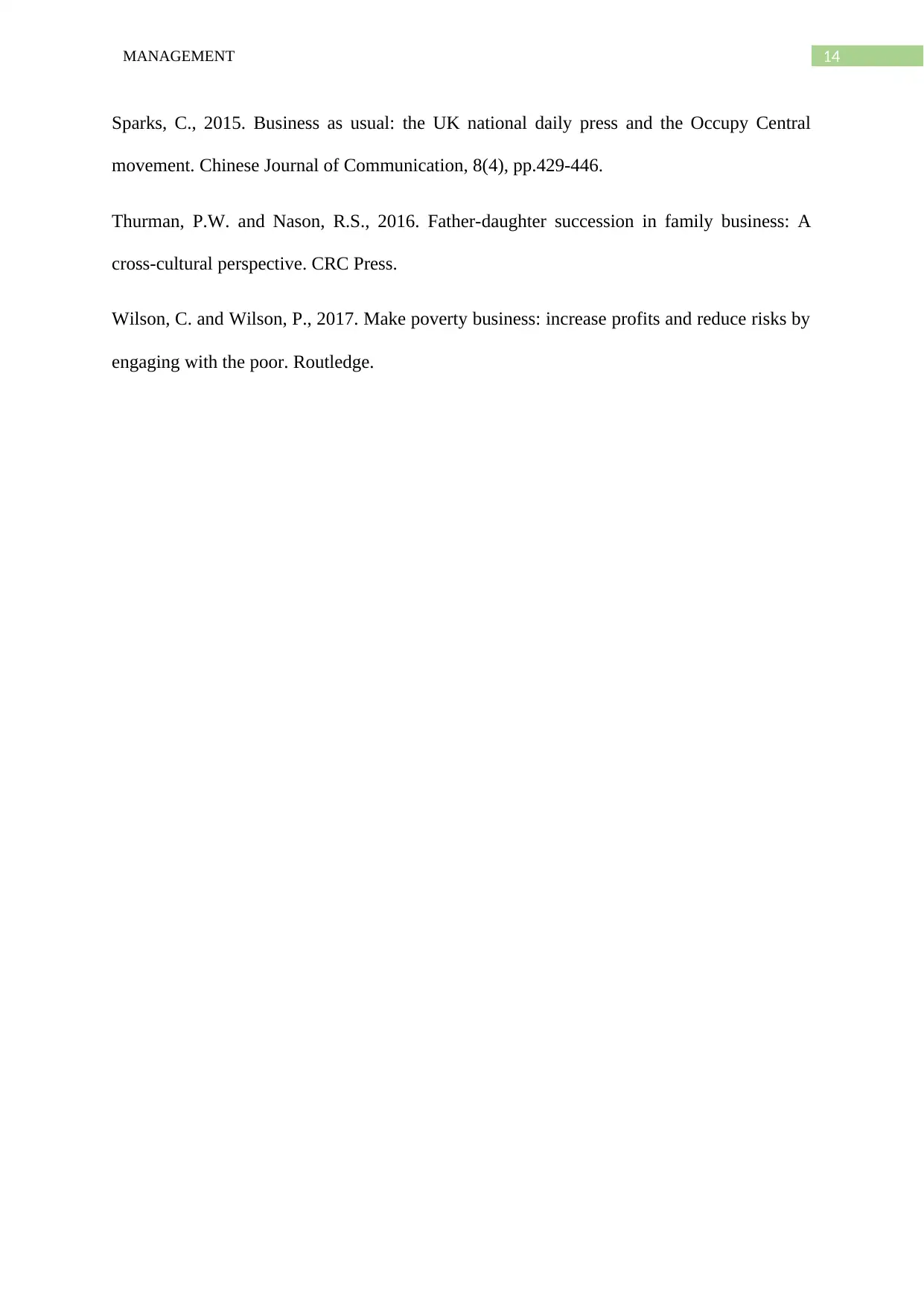
14MANAGEMENT
Sparks, C., 2015. Business as usual: the UK national daily press and the Occupy Central
movement. Chinese Journal of Communication, 8(4), pp.429-446.
Thurman, P.W. and Nason, R.S., 2016. Father-daughter succession in family business: A
cross-cultural perspective. CRC Press.
Wilson, C. and Wilson, P., 2017. Make poverty business: increase profits and reduce risks by
engaging with the poor. Routledge.
Sparks, C., 2015. Business as usual: the UK national daily press and the Occupy Central
movement. Chinese Journal of Communication, 8(4), pp.429-446.
Thurman, P.W. and Nason, R.S., 2016. Father-daughter succession in family business: A
cross-cultural perspective. CRC Press.
Wilson, C. and Wilson, P., 2017. Make poverty business: increase profits and reduce risks by
engaging with the poor. Routledge.
1 out of 14
Related Documents
Your All-in-One AI-Powered Toolkit for Academic Success.
+13062052269
info@desklib.com
Available 24*7 on WhatsApp / Email
![[object Object]](/_next/static/media/star-bottom.7253800d.svg)
Unlock your academic potential
© 2024 | Zucol Services PVT LTD | All rights reserved.





